What had tongues wagging was citizen’s journalism, dispatches by ordinary folk about electoral irregularities from the Rovuma to the Maputo rivers.
Good stuff: government cars illegally used for campaigning, [...]]]>

The sisters can do it by themselves. By A. Vilanculos
The buzz in Mozambique during the recent elections was not the TV debate among presidential candidates debate (there is none) or their programs (all vague).
What had tongues wagging was citizen’s journalism, dispatches by ordinary folk about electoral irregularities from the Rovuma to the Maputo rivers.
Good stuff: government cars illegally used for campaigning, with cellphone pics of their registration plates (until officials wised up and started covering up plates and ministry logos with party posters). Reports of youth tearing downs other party’s posters, fistfights, intimidation, and police lack of impartiality.
On election day, people told of late opening of polling booths and misbehaviour of poll officials and party observers.
Information was relayed by a network of 110 correspondents in 11provinces (most community radio reporters) and concerned citizens who texted, phoned and emailed.
The information was fact-checked and collected in a daily bulletin produced by the Centro de Integridade Publica (an NGO anti-corruption monitor).
The bulletin, in Portuguese and English, was emailed as pdf to some 3,000 subscribers, who redistributed it to at least double this number, and was widely reproduced, for free, by the local press, especially the 60+ community radio stations.
This was watchdog citizen journalism at its best.
Thanks to the Bulletin, Mozambicans had balanced coverage of the pre-poll partial exclusion of the new kid in the block, the opposition MDM, of the instances of ballot box stuffing and the invalidation of 100,000 votes.
The Bulletin provided a credible, professional and impartial source of information, above party politics (Mozambican media is aligned with political parties, ideological blocs and economic interests).
Bits of similar projecst exist elsewhere in Africa but I don’t know of any other so well-rounded.
In Kenya, during the post-electoral conflict two years ago, people texted and phoned in reports of violence to a hotline set up by an enterprising NGO. The information was quickly confirmed and uploaded onto a web map. The press, donors, and people could keep tabs on which parts of Kenya were burning.
Ghana made good use of sms by citizen correspondents during its recent elections.
Imagine if women developed such a tool.
Imagine that the 50-50 Campaign for equal political representation in Malawi could track women candidates during the campaign and the polls, and keep tabs on the insults, the stone-throwing, and the intimidation of women candidates seen last year.
In South Africa, during the 15 days against Violence against Women that started this week, a daily bulletin could keep track of gender-based abuse, collecting reports from police, rape crisis centres, and shelters. This would provide a graphic picture of South Africa’s second epidemic, after AIDS.

Grab it now! Pic b y A. Vilanculos
Historically, women are the last to use new technologies. This time, we should grab it now!
Check the Take Back the Tech site for cool ideas on taking control of digital technology to end violence against women.
And not only digital – one idea I liked is to go for a walk with a chalk and write up your thoughts on public space.
Watch the sidewalks of my neighbourhood in Pretoria – have chalk and thoughts, will walk.
* Read IPS stories on femicide in Chile, forced sterilisation in Peru and gender-based violence elsewhere.
]]>I will call her Gabra (gift, in Amharic), for our conversation was private. I met her at a monastery near Lalibela, the mystical city of [...]]]>
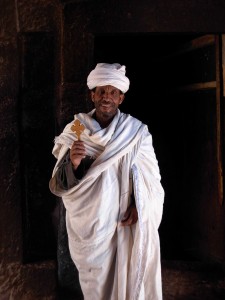
Patriarchal in all senses. By M. Sayagues
What drives a 17-year-old girl to enter a monastery? Today she is 30, and still happy about her choice. Her eyes sparkle and her laughter comes easy. She exudes peace.
I will call her Gabra (gift, in Amharic), for our conversation was private. I met her at a monastery near Lalibela, the mystical city of rock-hewn churches in northern Ethiopia.
Monastic life has a long tradition and prestige in the Ethiopian Orthodox Church. The oldest monastery dates from the 6th century. A monastic renaissance between the 13th and 16th century brought great moral and political authority to clergy.

Custodians of tradition
Gabra’s rock-hewn monastery dates from the 12th century. Her room is excavated in the pink tufa rock. Two built-in-the-rock platforms, covered with a thin mattress, do as couch and bed. An old cupboard holds a few plates and cooking utensils, three of the long green robes worn by Ethiopian peasants, the white headscarves that nuns wear, and two pairs of sandals.
For income, she and her fellow nuns weave cotton and silk into diaphanous shawls, sold at the monastery. She rises before dawn to pray – the first of daily seven prayers. Her ambition is to study theology in Addis Ababa or in Lalibela.
Gabra is not completely cut off from the world. She has a cellphone and a radio. On Sundays, relatives and friends visit.
Choices
I ask her if marriage and children ever interested her.
“It is a privilege to be single and not to have children,” she says softly, smiling but firmly. She sounds relieved.
Unmarried myself, I agree that motherhood and marriage are just one option. I understand the spiritual call, the peace of contemplation and withdrawal, of a simple lifestyle unencumbered by material things.
Yet I wonder if female genital mutilation had to do with her decision.
In Ethiopia’s eastern region, a girl might suffer genital cutting between the age of 15-17, before marriage. Her clitoris would be cut, sometimes the labia.
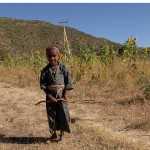
She has a right to her bodily integrity.
In Somali region, she would have infibulation at a younger age: the complete removal of her genitalia and, to preserve virginity, being stitched shut with an acacia thorn, leaving only a hole to urinate.
About three-quarters of women in Ethiopia between 15-49 have suffered some form of genital mutilation, said a government survey of 2005. The practice is fading – but too slowly, say activists.
It is not called mutilation for nothing. Sex and childbirth will be extremely painful and dangerous.
If finding a husband means suffering genital cutting, a hard mattress in a rock-hewn room is a much better place than a king-size wedding bed.
Gabra did not speak English, my male guide spoke little, and sex topics are taboo in Ethiopia, so the conversation went in another direction. Gabra was curious about my life, my work, and my daughter. 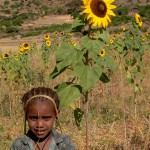
“Would you want to live like me?” she asked. “I don’t think I could,” I said. “But I feel the beauty of this simplicity.” She smiled.
Ethiopia looks and feels ancient and spiritual. Social cohesion is remarkable. But the same lifestyle that makes ferenji (foreigner, in Amharic) wax lyrical about the “biblical landscape and people” binds women to painful and dangerous traditions.
Some traditions are simply annoying. Women cannot join the rites if they are menstruating, ergo unclean. At no time of the month can women, local or foreign, enter the most sacred chapel of the Lalibela complex, Bete Mikael, where King Lalibela is buried. We are only allowed a glimpse from the door. In some monasteries, no females, including of the animal kingdom, are allowed.
Monastery visitors take leave at 5 PM (international time; in Ethiopian time, 11 in the night). I make my way down the stony path, the tufa rock glowing pink and gold in the sunset.
I am thinking that the monastery – the spiritual world – may be a blessed refuge from the hardship of being born female in a deeply patriarchal world.
Read recent IPS stories about genital cutting in Uganda, Sierra Leone and cross-border in West Africa.
]]>This was not an ordinary polio vaccination day for the children of Babile and Kombolcha, small towns about 500 km East of Addis Ababa. Ferenjis (foreigners in Amharic) [...]]]>

By Gifti Nadi
This was not an ordinary polio vaccination day for the children of Babile and Kombolcha, small towns about 500 km East of Addis Ababa. Ferenjis (foreigners in Amharic) had arrived!
About 100 Rotarians from the USA and Canada paid their way to Harar and Dire Dawa in Eastern Ethiopia to join local health workers in a massive drive to vaccinate 11.5 million children under five nationwide.
In recent years, 24 cases of polio have been detected in Ethiopia, likely coming from Sudan, says the World Health Organisation.
We travelled in small groups to the towns nestled against the backdrop of stunning mountains. We went door to door and were warmly welcomed by the primarily Muslim, Oromo and Somali families.
Last year, a survey showed that 70 per cent of mothers know about polio’s dreadful consequences and the benefits of vaccination, thanks to the work of dedicated community health workers.
Still, some believe that the vaccine might hurt the kids, so it was good to see the women coming forward.
Away from kitchen and kids
Note the word – women. It was 100 per cent women who brought their kids for vaccination, with the exception of one helpful young man. When a woman lied about not having any children, he convinced her to bring her kid out.
Otherwise, the men were either invisible (out in the town) or chilling out chewing chat (a mild narcotic that is legal), away from women, kitchen and kids.
Only once, in a mostly Somali village, a couple of older men came and asked us what we were doing. Just the Ferenjis in yellow shirts made them curious, I think.
Cheers for the women! They knew what the two little drops meant – a life free of polio for their children. One by one, they brought out their charming little ones while we took turns giving them the drops.
This never took place without a fight. Screams of terror and attempts to escape and spit out the drops were common, a natural reaction to being suddenly bombarded by strangers in yellow shirts.
The pictures tell all. Those under the age of 4 have a suspicious frown while their older siblings smile widely.

By Gifti Nadi
As we moved from home to home, the crowd grew larger. The playful kids practiced their English, held our hands and warmed our hearts. This was surely a life changing experience and a first for many on this trip.
I was blown away by the dedication and contagious spirit of mothers, community health workers and Rotarians. It was an honor to play a part in a global initiative to eradicate polio from this earth.
*The polio vaccination drive is part of a US$200 million Rotary International Campaign and matching pledges of US$355 from the Bill and Melinda Gates Foundation.
]]>A Saudi woman journalist escaped punishment last week but her cameraman wasn’t so lucky.
Rozana Al-Yami, 22, was pardoned by Saudi Arabia’s King Abdullah after the court sentenced her to 60 lashes for her work at the talk show Red Line in LBC, a Lebanese satellite TV.
[...]]]>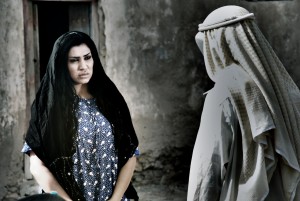
Shall we talk about it?
A Saudi woman journalist escaped punishment last week but her cameraman wasn’t so lucky.
Rozana Al-Yami, 22, was pardoned by Saudi Arabia’s King Abdullah after the court sentenced her to 60 lashes for her work at the talk show Red Line in LBC, a Lebanese satellite TV.
She made international news. He didn’t. No one mentioned that he has to serve a two-month jail term. His name remains anonymous in press reports.
Some would call this positive discrimination in favour of women but to me iit s a general bias. Women have been striving all over the world for equality, not favoritism.
Of course , Al-Yami doesn’t deserve to be punished. Neither does the cameraman nor anyone involved in the TV show that grabbed the hearts of million of Arab viewers but disturbed the conservative image of Saudi Arabia.
Let’s talk about sex
Sex remains a big taboo but the Arab world is opening up its airwaves to the topic. The LBC’s Red Line wasn’t the only TV show that tackles sex but there are few others. Be surprised: sex topics such as pleasure sex and organism that used to be discussed secretly by women during friendly gatherings are now discussed on air through many regional TV Channels.
One of the most popular talk show is Love Tales, by Dr Fawziya Duree, showing every Saturday on a private Kuwaiti Channel. Dr Duree holds a PHD in sex, culture psychology and believes in the need to discuss sex as an ordinary and important matter in life.
Her program started with a new, fresh approach to discussing marital problems and love relationships.

Sex talk: opening the door to freedom.
After gaining huge popularity, she shifted to more daring topics, such as sex during menstruation (a taboo among Muslims), passionate kissing and the anatomically correct description of genital parts.
In each show Dr Duree boldly discusses bold sex-related topic and receives calls from viewers calling for help in their sex-related conflicts. Although those programmes are opposed by hardliners, they are gaining popularity day by day.
Love Tales can be seen in Saudi Arabia. Let’s spare a compassionate thought for the poor cameraman jailed for something he could do freely in other Arab countries.
Images from the movie Anklet Dancer, Bharain 2008. Courtesy of director Ali Al ALi.
]]>http://www.campaignforrealbeauty.ca/bblank.asp?id=6895
Digital cosmetic surgery – nip-and-tuck, botox and liposuction, on the screen, with a click – render these models picture-perfect (excuse the pun) and thoroughly unreal.
There [...]]]>
http://www.campaignforrealbeauty.ca/bblank.asp?id=6895
Digital cosmetic surgery – nip-and-tuck, botox and liposuction, on the screen, with a click – render these models picture-perfect (excuse the pun) and thoroughly unreal.
There is no way a non-photoshopped woman can attain that perfection. Hey, we are human. We have flaws.
In France and the UK, women lawmakers recently proposed that ads should disclose when their photos have been digitally manipulated to a great extent. They argue that bodily digital perfection in ads undermines the body image and self-esteem of girls and women.
Anorexia, bulimia, eating disorders, obsession with thinness and unnecessary cosmetic surgery follow. Meanwhile, sales of weight-loss products and push-up bras soar.
The tricky problem for lawmakers and advertisers alike is where to draw the line between (acceptable) touching up a pimple or a wrinkle and engaging in full (unacceptable) deception.
Among the most egregious offenders: the French magazine Paris Match nipped the bulging love handles of President Nicholas Sarkozy, in evidence while he canoed bare-chested in the USA.
Oprah Winfrey always has a waist in the cover of O magazine, while flat-chested Keira Knightley miraculously acquired big boobs for her recent Chanel Mademoiselle perfume ad.
The alcoholic drink Campari must have some magical effects on bones because actress Jessica Alba got sharper collarbone and knee definition, longer arms and a tinier waist in its recent ad.
Eating disorders once afflicted mostly affluent white teen girls in the West. Now they have spread across the world, among all ages and ethnic groups and, increasingly, among young men.
It is harder to quantify how the unreal perfect bodies in ads distort the self-image of girls and boys worldwide.
Watch the video and share your thoughts about the proposed disclosure measures.
]]>Burqa-wearing women may lose the right to drive in Bahrain over a conflict between government and conservative lawmakers.
The government wants to amend the traffic law and grant male traffic officers the right to ask women to lift the veil and show their faces.
On the other [...]]]>
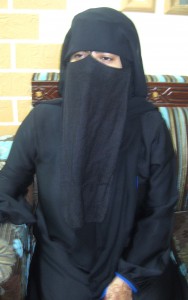
Dressed to drive? By S.Hamada
Burqa-wearing women may lose the right to drive in Bahrain over a conflict between government and conservative lawmakers.
The government wants to amend the traffic law and grant male traffic officers the right to ask women to lift the veil and show their faces.
On the other hand, some lawmakers are loath to approve the amendment or at least demand that female traffic officers be employed for this task.
Let’s hope that in either way it will be a win-win situation for women: that they will continue to drive, and enter a job sector that has been reserved for men since the 1970s. Bahrain doesn’t impose a dress code on women. Wearing a burqa (or Niqab, in Bahrain) is a personal choice.
OK, not all women here wear a burqa as personal choice; some do it to obey their male relatives or conservative families. Whatever the reasons, burqa limits women’s social and professional activities. For example, they cannot eat at restaurants without closed cabins nor work in many sectors except those with limited, female-only jobs.
Anyway, women who feel comfortable wearing a burqa shouldn’t be discriminated or underestimated. Females worldwide should be allowed to speak their minds, lead their lives to the fullest and freely practice their faiths.
Forcing women to take off their burqa is as cruel as forcing the veil on them.
A measure of independence
Burqa-wearing women in Bahrain have one important right – they can drive.
This is fairly new. Before 2006, burqa-wearing women drivers were harassed by traffic officers and fined.
In 2006 the government allowed burqa-clad drivers as a result of pressure from conservative MPs, who represent the majority of the Lower House, with the proviso that these women should, if requested, show their faces to traffic officers, for security reasons.
Not all were pleased with that decision. A Bahraini columnist, Abdullah Al Ayobi, argues that, for security reasons, fully covered women should not drive. He wrote last year that Bahrain was the only country in the world that allows unidentified individuals to drive.
Being able to drive has made life easier for women, especially with Bahrain’s poor public transportation.
We will soon know whether burqa-wearing women will continue to drive legally in Bahrain.
]]>Seven PM at the supermarket. After a long day at the office, she is standing in line to pay for groceries to make dinner, stealing glances at her watch, grappling with two young kids who want her to buy some chewing gum…
Does this picture ring a bell? Survey [...]]]>
Seven PM at the supermarket. After a long day at the office, she is standing in line to pay for groceries to make dinner, stealing glances at her watch, grappling with two young kids who want her to buy some chewing gum…

Unequal sharing of the work pie. M. Sayagues
Does this picture ring a bell? Survey after survey across the world report that women put in between 20 and 30 hours a week of domestic and family work. Unseen, unsung and unpaid, yes, but not insignificant.
Unpaid work in the home, done mainly by women, is estimated at approximately 50 percent of all productive activity even in industrial countries, and as much as 60-70 percent in many developing countries,” says Hazel Henderson in an interview with IPS.
“The U.N. Human Development Report and its Human Development Index (HDI) in 1996 calculated that unpaid work was estimated at 16 trillion dollars (11 trillion dollars by women and 5 trillion dollars by men). This figure was simply missing from the official global GDP figure of 24 trillion dollars, although a truer figure would have been 40 trillion dollars for global GDP in 1996.”
Henderson – futurist, economic iconoclast, founder of Ethical Markets Media and author - was commenting on the just published “Stiglitz-Sen Report”, which argues that countries need to find ways to measure well-being alongside raw economic growth.
Having dedicated her studies to an interdisciplinary economic and political theory focused on environmental and social issues, her views couldn’t be more pertinent.
(Find Henderson’s books)
]]>Ranging from sassy dialogue to black humour, these are one-minute comedies with a smart punchline. The Mother from Hell and the Spoiled Brat skits have [...]]]>

Make safe sex fun. By M. Sayagues
Ranging from sassy dialogue to black humour, these are one-minute comedies with a smart punchline. The Mother from Hell and the Spoiled Brat skits have a Borat-like humour. And who would have thought a condom ad from India would depict anal sex?
Click on the ad from Argentina even if you don’t speak Spanish. Everybody who has been a teenager will chuckle about these teens, their parents and their predicament. (Watch it here)
Laughing got me thinking about how seldom one sees humorous ads about condoms in English-speaking Southern Africa. I have seen some cool ads in Mozambique, though – I think there were Brazilian advisors involved. Where is the fun?
Most ads about condoms in Southern Africa are earnest, even boring, stressing safe sex, HIV prevention, responsibility. Few treat sex as an activity filled with desire, romance, anticipation, indecision, ambiguity, and pleasure.
Yes, for man, sex may be forced, violent, unwanted, unpleasant, too quick, too slow, or too risky.
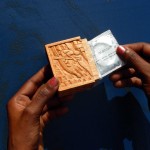
A pretty condom carrying box. By M. Sayagues
But for many others, it is not. Ads should target different segments. If we want to attract the attention of the young instead of totally turning them off, ads must be cool.
It is a fine balancing act. About three years ago, the South African anti-AIDS campaign LoveLife published a monthly insert in major newspapers, called Uncut that tried so hard to be blasé it was borderline pornographic.
There is a distance from acknowledging that young people have sex to portraying teens dressed like hookers in positions suggesting group oral sex. Many parents threw Uncut straight away. My daughter, aged 14 then and no prude, thought it cheapened girls.
After many complaints and public debate, Uncut changed. It went overboard. Now it reads like a church teen newsletter, wholesome and boring.
It may be that the terrifying scale of the AIDS pandemic in Southern Africa inhibits ad campaign planners and donors from portraying safe sex as fun. Maybe it is fear of offending churches, politicians and parents. And talking about sex has traditionally been taboo.
Yet, to get young people to practice safe sex, condoms must become part of their sexual paraphernalia and discourse. A bit of humour helps.
So have a laugh and tell us which is your favourite!
Ad selection courtesy of Chris Well, a designer and sexual rights activist at Conversations for a Better World. Check out his website for teens and reproductive health: www.15andcounting
The UN has finally decided to stand up for women! A decision to create a new agency for women was taken by the General Assembly on September14.
Our colleague Thalif Deen, IPS bureau chief in New York, was the first and only journalist to report it for the [...]]]>

A breakthrough for us as well? M. Sayagues
The UN has finally decided to stand up for women! A decision to create a new agency for women was taken by the General Assembly on September14.
Our colleague Thalif Deen, IPS bureau chief in New York, was the first and only journalist to report it for the first several hours.
But this blog is not to crow about our scoop.
I’m quite excited by the prospect of a new women’s agency with money and political power. No longer will the world’s feminists have to lobby from the outside to put their views on the table. They have now won admission to the high table.
Any one of those bright, articulate, activist women can emerge to lead the agency. The reality is likely to be less rosy. But chances are that, because it’s new, it will be less under the thumb of the old boy network.
You think I’m a romantic? What the hell, there is no harm in dreaming, is there? I like to think that there was no way that the General Assembly could have once again shelved the plan for a new women’s agency.
It’s 14 years since Beijing. All the small and big things that governments were forced to accept around women’s rights (CEDAW, MDG, etc.) made it impossible for any country to block the efforts of myriad initiatives (from small grassroots groups to reforms in government policies even if they started as mere tokenism) and to politicise the cause of gender equality.
I do see great hope in the increasing presence of women in politics – Liberia, Japan, India, wherever you look, even Iran (new ministers) and the Gulf (Saudi Arabia has made a few small concessions to women!).
Of course, there is a backlash too – more violence against women worldwide.
As IPS gender editor, I am sure we will keep track of the new agency as it will be a key player achieving the MDG3 goal – gender equality.
Well, hope springs eternal!
]]>Have you seen the Italian documentary Il corpo delle donne (available with English subtitles)?
It is horrifying, like a horror movie.
“Women –real women— are an endangered species on television, one that is being replaced by a grotesque, vulgar and humiliating representation,” says an introduction to the documentary [...]]]>
Have you seen the Italian documentary Il corpo delle donne (available with English subtitles)?
It is horrifying, like a horror movie.
“Women –real women— are an endangered species on television, one that is being replaced by a grotesque, vulgar and humiliating representation,” says an introduction to the documentary by Lorella Zanardo.

This picture shows a woman hanged from the ceiling, like a ham, surrounded by legs of ham. This and other images, taken from real TV shows, speak for themselves.
Il corpo delle donne is a 25-minute terrifying documentary that undresses the degradation of women in Italian television.
“This led us to select television images that share a common manipulative exploitation of the woman’s body, to let people know what is happening –not only people who never watch television, but especially those who watch it but ‘don’t see’,” says the introduction.
Why aren’t women, and men, rallying against this treatment?
Link with Il Corpo delle Donne in Facebook.
]]>